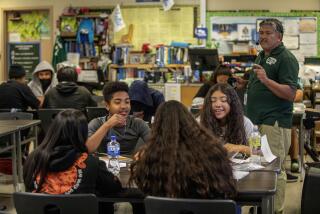Learning, Like Other Life Skills, Improves When It’s Practiced
- Share via
Don’t just sit there, learn something.
Summer is almost here, and for many students (of all ages) this means time to tune out. How can you take advantage of this time to learn more about things you want to understand?
For 10 weeks during the summer, some of you will put your education on hold. Instead, what if you took advantage of the school-less, teacher-less days to discover more about what genuinely interests you?
Students who spend time discovering their own interests play a prominent role in their own development and scholastic success. As a teacher, I take note of students who have a variety of outside hobbies, sports, activities and interests. These people seem to pick up new skills and knowledge more easily. Students who practice learning become better at it, whether they are learning in the classroom or at the beach.
Two tools students can take advantage of during the 10-week respite from the classroom are collecting an interest inventory and developing a network.
A saying I like to share is, “The more I learn, the more I can do; the more I can do, the more I learn.” This is a self-fulfilling cycle.
* Tool 1: Tap your interests. Get a piece of paper, a poster board or a journal to write in. Using colored pens, write down the names of places, activities, people or ideas that interest you. Each day, add one new item to your list. The goal is to spend a few moments each day thinking about your own development.
Use the world you live in to let you know what your interests are. As the summer goes by, track those items on your list. Occasionally ask yourself if there have been opportunities to learn about anything on your list. The purpose of this collection is to make you more aware, not to force you to study more. You can become observant of those things that interest you and later seek ways to learn more about the things that are important to you personally.
* Tool 2: Networking steps. Take the initiative to learn about your world. Meeting and talking with other people can provide you with more information about the community you live in and help you to become directly involved in learning.
*
One-to-one communication is quickly becoming the job skill of the new millennium. Go out and introduce yourself to one person in your community each day. The goal is to connect with people who live and/or work in your community.
Here are some ideas to get you started: Invite the owner of a local restaurant to have lunch with you; ask the manager of a local entertainment business to give you a tour; ask an executive for a telephone conference where you ask some questions about his field; send an e-mail to a university professor asking about her current research projects.
Every person you contact may not be able or willing to connect with you. Don’t be discouraged. Determination and persistence are life skills, just as important as learning and developing an understanding of your world.
As a community, let’s encourage students to actively discover what interests them. Students, make up some new ways to learn and some new things to learn about. Use your vacation to your advantage. How do you want to learn today?

